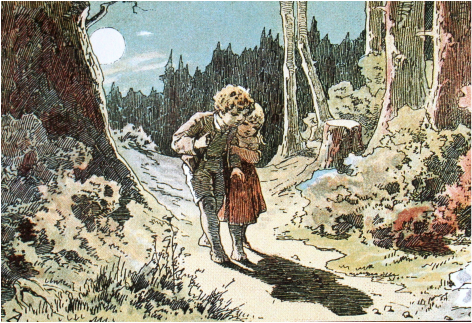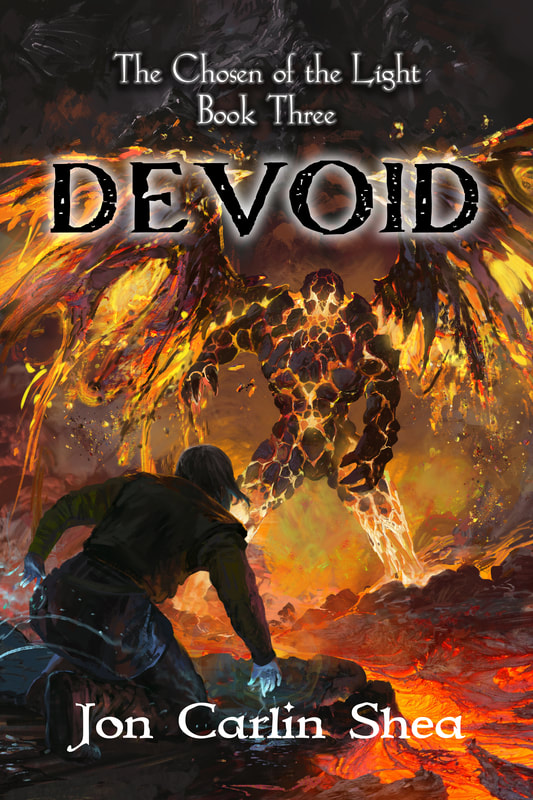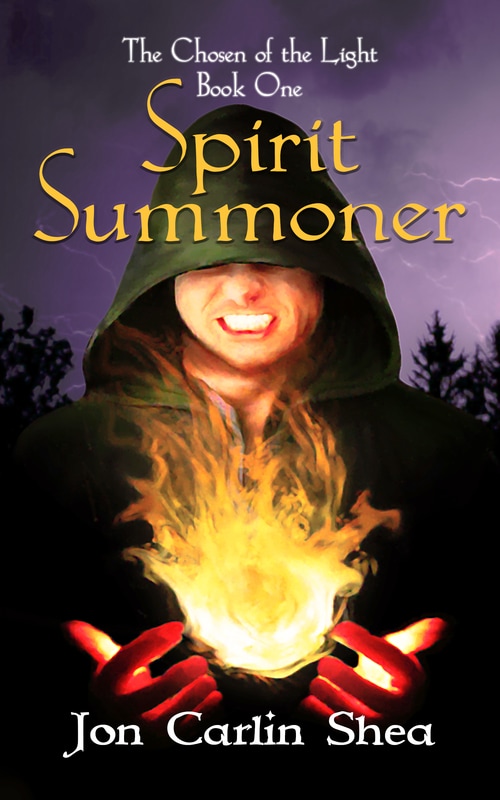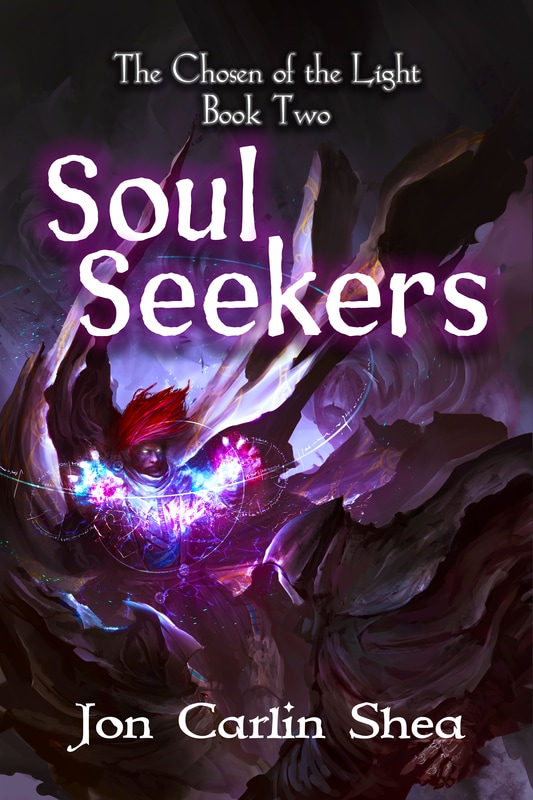|
Years ago, I started writing a book. When I say years, I really mean decades. This book, a fantasy novel, told the story of Darr Reintol and his many, many friends as they sought out the Chosen of the Light. Like many of the books I’d been reading at the time, this was to be an epic fantasy. In true epic fashion, my story spanned thousands of years in a world rich with a culture and history of its own, with many different characters, each with their own individual stories. At the time, I believed I’d written a truly engaging book, something that any reader of epic fantasy would love.
The world of publishing did not agree. Rejection after rejection made me try another angle by seeking an agent, and again, I could find no purchase. I divided up my novel, creating three books, and after another year of submission, I finally landed a publisher and an editor. It was only then that I found what may have been the fatal flaw in my writing. Story. Story is the truth behind all that my writing does, for it is the storytelling that so fascinates me. Since before I could write, I loved telling stories, creating new worlds and things and people with my imagination. But story is what lacked in my novel as well, for in trying to pack in everything epic, I lost my narrative. When my editor, Shawn Howen, first told me how much I needed to cut from my first book, I was distraught. I insisted I needed every bit of information, every bit of history, and every odd perspective in order to make the story work. Shawn disagreed. Fortunately, she saw the story laying beneath the scattered histories and perspectives. She knew I was writing about Darr, which is very true, but I was also writing about the world of Ictar, too. What does the history of the Ancients have anything to do with how Darr feels and what actions he takes? When I tell the story from the point of view of some distant character not even connected to Darr, am I furthering Darr’s story or my own? If I view my story with Darr as linear, any time I drop into a rambling about my world’s history or another point-of-view, I’m creating a stress point in my line. With too many stress points, my line, and my story, crumbles. I suffered, but I recovered. Like the true storyteller I aspire to be, I refocused my thoughts and edited my book accordingly. I told my story about Darr. In the end, I’ve become a much better writer and storyteller, but all of these memories of revising is coming back to me because it’s happening again. Currently, I’m working on the third and final book in my series, but the story I always believed was there just isn’t there. It has become the story that never was, because I have changed as a writer, leaving me with parts that no longer fit. The solution is figuring out where the real story is, and for me, that will be a point of some frustration, but also fun. I haven’t had the chance to create new material in this book for a long time. In find the story that never was, I’m tasked with finding the story that will be.
2 Comments
Growing up, I was involved pretty heavily with my church, and while that part of my life has passed, many of those experiences (as all experiences do) shaped me into the person I am today. So, it’s no surprise that those experiences helped shape my writing and the worlds I create. When I was in middle school, I had the amazing opportunity to travel to Jamaica on a mission trip. This was my first trip out of the country (sorry, Canada doesn’t count), and it was the farthest I’d ever flown on an airplane. Did I mention I was traveling to a third world country, one I knew next to nothing about? I was anxious, excited, and completely unsure of what to expect. So, when I met Martin, it’s no surprise that he would turn into the basis of one of my most important characters. Martin was one of the missionaries residing in Jamaica. He helped shuttle us around, introduced us to the people, and taught us about the culture and the land. I remember him being tall and intimidating, but he was charismatic in his own way. He had wide features and a deep voice, and I couldn’t help but listen to him any time he had something to say. I felt like I’d be missing something if I didn’t.
When I really got serious about The Chosen of the Light, I began rewriting and fleshing out my characters, turning them into real people. Most of my characters had always been real in my mind, so fleshing them out wasn’t too much of a problem, but there was one that I couldn’t get a grasp on. Nidic Waq, the prophet featured throughout my series, and arguably one of the most important characters. Spirit Summoner might be about Darr, but Darr is driven and guided by Nidic Waq. My problem with Nidic Waq was I didn’t have a good handle on him. He was a wizard-type character in my mind, but that’s all I really had on him. Besides, he wasn’t a wizard, he was a prophet and a Spirit Summoner. He didn’t have any human characteristics, and I knew that had to change. No one in my life really seemed to embody the characteristics I imagined he should have, and so I had a difficult time trying to make him into a “real person”. Martin, the missionary from Jamaica, finally helped me figure it out. Martin with his intimidating presence nonetheless drew me in and made me want to listen to whatever he had to say. He was the perfect basis for Nidic Waq. Of course, I gave my character my own little tweaks, making him exactly what I envisioned, but if it wasn’t for meeting Martin, I don’t know that he’d be the same character he is today. I found out a couple years later that Martin had left his position as a missionary, turning away from friends and family, but that never discouraged me. If anything, it made me realize Martin, like Nidic Waq, was human, and prone to dreams and desires. I looked at Nidic Waq in an entirely new way, as a human who’d made certain decisions that led him in a certain direction. Maybe one day, his choices will take him down a different path. Like Hansel and Gretel leaving a trail of breadcrumbs through the forest, I leave little markers for myself as I edit. They're not as tasty as breadcrumbs, but they serve their purpose. They help me find my way back to whatever story I was originally trying to tell.
While editing Book Two (and now Book Three) of The Chosen of the Light, I've been finding it difficult to keep the story focused and moving. I'm using the techniques I learned from while editing Spirit Summoner, but I'm throwing in a trick of my own: Breadcrumbs. This idea won't work for everyone. Maybe it only works for me. But I thought I'd share it anyway. If anything it'll give you some insight into my own writing process. That being said, I'm a planner when it comes to my writing. I like to know the story heading into it. I spend a good while sorting out many of the details in my head before I ever begin writing. I've tried to just let the story take me where it will, but the effects are often a disaster of plotholes. Now, I don't need every detail or even every character, but I must know the general direction of the story. You might be asking what this has to do with editing and here's what I've found. Even the best planner cannot always stick exactly to the plan. Writing is fluid, as if storytelling. Sometimes, when you finally get to your planned ending, little changes along the way have changed the overall story. When I begin editing, the first thing I do is run through the story, chapter by chapter. I give each chapter a quick perusal, then at the top of the page, I leave a comment indicating the POV and a light synopsis for what's happening. I can easily scan between chapters, giving myself a clear picture of the direction things need to take, and at the end of the book, I can tell what needs to be done to maintain the story. The breadcrumbs remain in place until the very end, right before I send off to my editor. You never know when you're going to find yourself lost in the woods of your own writing. 
Storytelling is a wonderful thing. Telling stories allows us to share feelings of love or sadness. We can share thoughts or memories, impart knowledge, or weave incredible fantasies. Figuring out how far you'll bring your audience into your story depends on a number of things, beginning with your point of view.
Are you telling this story as an omniscient narrator, giving your audience details about everyone and everything? Or are you telling this from a limited perspective, giving your audience details specific to one character?
MISSION OBJECTIVE
When beginning to write a story, I find it helpful to ask the question "What is my mission objective?" Am I looking to enlighten or entertain? Do I simply need to get a story out of my head? Is there a character itching to get out? Figuring out my mission objective is helpful in figuring out my POV, but it doesn't always get me going in the right direction. Case in point: I've been bouncing around a story for a couple of years now, a story about a young man with a peculiar superpower. When I first sat down to write this story, I did so because I had a character (and more specifically, his power) to write about, so I wrote from the first-person narrative. EX: Still, I didn't cry. I watched the gunman, my eyes burning with hatred. I wanted to make this man suffer. But I knew I had to wait. I had to be strong. My opportunity would come.
Something was always missing from this story, and I couldn't put my finger on it. I ran it through a local writing group I was working with a couple years ago, and one of the suggestions was to change to POV. Whoa. What? Change my mission objective? NEVER! But the more I thought about it, the more I began to realize what changing perspectives could do to this story. A lot of the critiques centered around the character and how limited of a character he was. In order to see his real depth, maybe I'd have to look at him from someone else's point of view.
THE LONG HAUL
As you can see, figuring out my mission objective is helpful, but not a definitive answer. My choice of POV was put to the test again when I began editing Spirit Summoner. My mission objective in writing The Chosen of the Light was to entertain and to give someone else the same spark of imagination that I'd been given so long ago. I also had another objective, one I don't share that often: I was writing it for me because this was my world, and this would be my way of making it real. What I wrote was an entire chunk of Ictarian history, retold from many different points-of-view. To me, every single word was necessary to tell the story, but my editor showed me a different side. Every time I shifted POVs, I detracted from the story. As my reader tried to figure out who's head they were in this time, they lost a little of the story. At first, I resisted this concept with a heavy heart. I didn't want to rewrite or remove chapters to accommodate one perspective. I wanted the entire story just the way I'd written it. But I believed in my editor, and I knew deep down she was right. I had to ask myself about my mission objective again. Was it really all about me, or was I writing to tell a story? Ultimately, it's both, although I decided to limit the POVs I told my story in. There's always more stories in my head to try it differently!
What's your favorite point-of-view to read in?
 As a fantasy author, it seems strange that I know almost nothing about Robert Jordan. After all, he stands out as one of the "big names" in fantasy, and yet, I've never cracked one of his book. It's even stranger that my first book would've had a different title if not for him. You see, when I first began writing The Chosen of the Light (actually, right up until I began submitting), my manuscript had the title of The Children of the Light. Any Wheel of Time fans out there? I'll get to why I changed the title of my book in a minute, but I wanted to share some interesting ideas about book titles. For a new writer (and established authors), picking a title can be a challenging ordeal. Sometimes a title comes to you and it fits just fine. Other times you're met with conflicts. On the rare occasion, a title doesn't even pop into your head until you must have one. I still have a series of notebooks devoted to Something New, a book that has no title 10 years after I started it. Whatever title you pick, here's some things to remember about the function of a title (thank you, Scott Berkun):
So not only do you have to find a title that's different and interesting, you have to find something that can withstand repetition. A title that readers might find embarrassing would be hard to market. A title that's too cliche might market okay, but I doubt it'd interest new readers. Titles are a personal thing for writers, like naming your child. Writers oftentimes take pride in the names they select for their "children", and so it can be difficult to take criticism or even part with a chosen name. When I first discovered Robert Jordan had taken the name of Children of the Light, I was devastated. Since we were both publishing fantasy, I couldn't keep the title without feeling like I was stealing from him. Worse, I'd been calling my heros the Children of the Light since the beginning, and suddenly, I'd have to change that. What I settled on doesn't stretch things too far, but it was a shock nonetheless. There are tons of differents way to come up with a title. Multiple websites and books out there promise to tell you what will work, but I say, trust your instincts and do your research. Had Children of the Light been used in another genre far from the fantasy realm, I probably would've kept it. In the end, it didn't do me much good because I split that book up anyway. No one can predict if you have a sucky title, but your name will be on whatever you put out there. Be sure that you, the author, are proud of whatever title you pick. Your stories, your writing, should be important to you, and it all begins with a title. The more closely the author thinks of why he wrote, the more he comes to regard his imagination as a kind of self-generating cement which glued his facts together, and his emotions as a kind of dark and obscure designer of those facts. Reluctantly, he comes to the conclusion that to account for his book is to account for his life. |
Archives
March 2019
Categories |







 RSS Feed
RSS Feed
